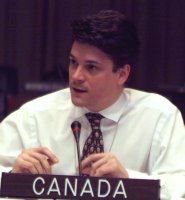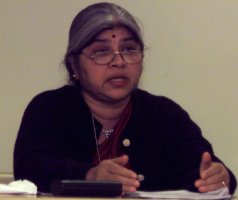|
|
Working Group I discusses Commitment 9 on resource
allocation
|
|
Canada
proposed further study of the feasibility of a currency transfer
tax. Japan and the US opposed. The EU said studies on such a tax
were already being carried out. Chair Maquieira suggested more explicit
language when describing such a study, such as a cost/benefit analysis,
instead of feasibility. Canada agreed to redraft its proposal. The
G-77/China said it would comment after Canada's redraft.
|

|
|
|
The EU (bottom
center) with the G-77/China
In 111 (d),
on exchanging information to prevent tax avoidance, delegates agreed
to a G-77/China reference to promoting treaties for avoiding double
taxation.
|
The Holy
See
: In paragraph
108, on undertaking nationally-prioritized efforts to mobilize
domestic social development resources, the G-77/China opposed
and the EU supported a Holy See proposal to refer to reducing
illegal transfers of small arms.
|
|
|
The
US and the EU consulting (left); Iran intervenes on the issue of
taxation
|
| Plenary: Statement from Switzerland on the Special Session
and NGO Statements |
|
|
Switzerland
noted that preparations are on track for WSSD +5 and for a parallel
forum for civil society, parliaments and the private sector. NGOs
spoke on behalf of themselves and various caucuses. |
|
The US delegation meet with NGOs
NGOs
raised the issue of solutions to declining US ODA such as promotion
or exploration of the feasibility of national-level currency transaction
taxes. The US delegation stated its preference that if ongoing studies
were to be explored they should continue in Bretton Woods, WTO or
other non-UN system fora.
|
|
|
The EU delegation meet with NGOs
The EU delegation responded to NGO concerns about declining enthusiasm
for the UN system by highlighting instead the lack of knowledge and
capital city technical expertise, They neither supported NGO proposals
for a Tobin tax nor the terminology distinguishing civil society from
the private sector. The NGO proposal for a convention to eradicate
global poverty was not supported and the EU delegates emphasized the
risks and opportunities associated with globalization. |
|
Finance, Taxation and Development
This
side event was sponsored by the International Council on Social
Welfare. Panelists were Professor Lance Taylor, New School for Social
Research and
|
|
Achieving Pro-Poor Economic Growth
|
|
The
International Labor Office, in cooperation with the Division for
Social Policy and Development sponsored this event. Left to right:
Rohini Nayyar, Planning Commission, India, Stephen Brown, Director,
UNDP Division for Social Development and Poverty Elimination, and
Moderator Sonia Elliot, Permanent Mission of Guyana.
|
|
Jean
Majeres, Chief Employment-Intensive Investment Programme, ILO, discussed
labor intensive employment. He said employment investment policy
can be combined in a technically sound manner and stressed, inter
alia, local level ownership, prioritization of local needs,
mobilization of local resources, human resource development and
institutional capacity building, and private sector development
and integration of social policy goals.
|
|
 |
Rohini
Nayyar, Planning Commission, India, discussed a three pronged
approach for poverty eradication, including growth, entitlements
from direct state intervention, and improving capabilities of
people.
|

 Linkages Coverage of the World Summit for Social Development in Copenhagen
Linkages Coverage of the World Summit for Social Development in Copenhagen
 A summary of the major issues
A summary of the major issues
 Agenda for the Second Session of the PrepCom
Agenda for the Second Session of the PrepCom
 Secretariat web site with official
documents and information
for NGO participants
Secretariat web site with official
documents and information
for NGO participants
 Secretary-general's
Report on the Implementation of the Outcome of the WSSD
Secretary-general's
Report on the Implementation of the Outcome of the WSSD
 Summary
of the WSSD agreements
Summary
of the WSSD agreements
 Information on the WSSD+5 Special Session
Information on the WSSD+5 Special Session

|